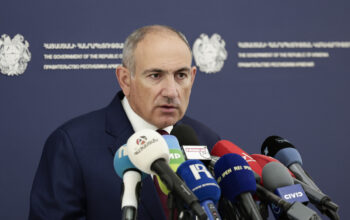The Armenian government officially confirmed Wednesday that Prime Minister Nikol Pashinyan will travel to Washington, D.C., for a high-stakes summit with U.S. President Donald Trump and Azerbaijani President Ilham Aliyev, scheduled for this Friday at the White House.
According to a brief statement from the prime minister’s office, Pashinyan is set to hold separate bilateral talks with Trump prior to a trilateral meeting aimed at “advancing peace, prosperity, and economic cooperation in the region.” The statement stopped short of confirming whether a formal peace agreement will be signed.
Citing a U.S. official, Reuters reported Tuesday that the talks could result in the announcement of a “framework for a peace agreement” between Armenia and Azerbaijan. Separately, Middle East Eye noted that both leaders may sign a “memorandum of understanding” reaffirming their mutual commitment to a peaceful resolution of the decades-long conflict.
Despite formal negotiations earlier this year that produced a draft treaty, Azerbaijan has continued to demand amendments to Armenia’s constitution as a condition for signing. That demand remained unchanged after the July 10 Pashinyan-Aliyev meeting in Abu Dhabi.
One of the more contentious issues likely to surface during the talks is Azerbaijan’s long-standing demand for a land corridor through Armenia’s Syunik region to its Nakhichevan exclave. Earlier this year, the U.S. floated a proposal under which the corridor would be managed by an American company, potentially under a 100-year lease. Following the Abu Dhabi summit, Pashinyan indicated he was open to such an arrangement.
Edmon Marukyan, leader of the opposition Bright Armenia party and former Pashinyan ally, warned that Aliyev will likely use the Washington summit to secure American backing for the so-called “Zangezur Corridor.”
“I can assume that in return for agreeing to go [to Washington], Aliyev wants to secure the American side’s support so that he can get his coveted ‘Zangezur Corridor,’” Marukyan said.
Hakobyan responded that the Armenian government would not accept any agreement that jeopardizes the country’s territorial integrity. But Artur Khachatryan of the opposition Hayastan alliance dismissed those reassurances, claiming, “[Pashinyan] is ready to give up everything to cling to power.”
Opposition leaders and many analysts argue that placing control of a transit corridor under U.S. administration would weaken Armenian sovereignty and bolster Azerbaijan’s geopolitical ambitions.
The sentiment is echoed by diaspora leaders in the United States. Aram Suren Hamparian, Executive Director of the Armenian National Committee of America (ANCA), issued a scathing statement in response to the summit:
“If President Trump’s looking for credit for forcing a reckless ‘peace’ on Armenia, he certainly won’t be getting any from the U.S. citizens who are most invested in this issue — namely, Americans of Armenian heritage — voters who stand foursquare against unilateral Armenian concessions of territory, security, and sovereignty made at the barrel of an Azerbaijani gun.”
With tensions high and deep divisions among Armenians at home and abroad, the Washington summit is shaping up to be not just a diplomatic milestone, but a test of how far Armenia’s leadership is willing to go — and what it’s willing to give — in pursuit of a fragile and controversial peace.




